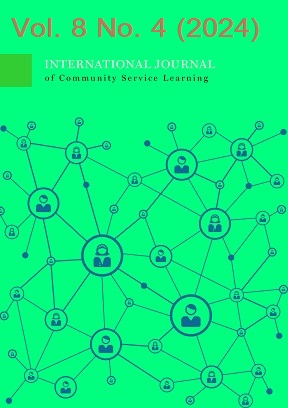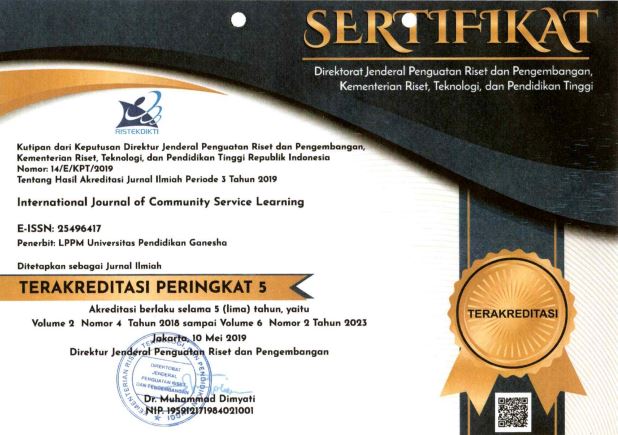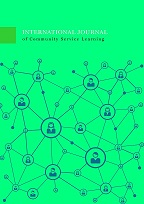Teacher Competence in the Use of ChatGPT for Developing Learning Media in Vocational High Schools
DOI:
https://doi.org/10.23887/ijcsl.v8i4.85397Keywords:
ChatGPT, Artificial Intelligence, Learning Media, Teacher Competence, Vocational High SchoolAbstract
ChatGPT technology opens up great education opportunities, especially in supporting the development of educator competencies needed in the 21st century. However, teacher competency in utilizing Artificial Intelligence (AI) technology is still low. As a result, existing learning media are not optimal in presenting engaging and interactive digital teaching materials according to the needs of students in the era of education 4.0. This community service aims to improve the competence of vocational high school teachers in using ChatGPT and AI applications for the development of learning media. This study involved 60 teachers from various fields. The methods used were lectures, discussions, and direct practice with online assistance. Teachers were trained to create interactive teaching materials using ChatGPT and other AI applications. The data analysis technique used qualitative descriptive analysis. The post-test results showed a significant increase in teacher competency in using AI applications, with an average score above 4 out of 5 in key aspects such as material usefulness and skill development. The activity results showed increased teachers' ability to utilize AI technology to create digital-based learning media, such as learning videos and interactive teaching materials. This activity significantly improves the quality of the learning process in vocational high schools. This training is expected to optimize teachers' digital skills to face challenges in the era of education 4.0.
References
Adeoye, M. A., Wirawan, K. A. S. I., Pradnyani, M. S. S., & Septiarini, N. I. (2024). Revolutionizing Education: Unleashing the Power of the ADDIE Model for Effective Teaching and Learning. JPI (Jurnal Pendidikan Indonesia), 13(1), 202–209. https://doi.org/10.23887/jpiundiksha.v13i1.68624.
Ahmad, R. M. (2024). Efektivitas Pelatihan Integrasi Canva dan Chat GPT sebagai Media Pembelajaran bagi Pendidik di kota Kupang. Journal of Education Research, 5(2), 1081–1088. https://doi.org/10.37985/jer.v5i2.953.
Alam, M., & Hasan, M. (2024). Applications and Future Prospects of Artificial Intelligence in Education. Zhonghua Er Ke Za Zhi / Chinese Journal of Pediatrics, 10(1), 197–206. https://doi.org/10.3760/cma.j.cn112140-20211129-01001.
Aldoobie, N. (2006). Sprachwandel in übersetzungsbearbeitungen zwischen 1846 und 1999. Neuphilologische Mitteilungen, 107(3), 361–373.
Annas, N. A., Wijayanto, G., Cahyono, D., & Safar, M. (2024). Pelatihan Teknis Penggunaan Aplikasi Artificial Intelligences (AI) Chat Gpt Dan Bard AI Sebagai Alat Bantu Bagi Mahasiswa Dalam Mengerjakan Tugas Perkuliahan. Journal Of Human And Education (JAHE), 4(1), 332–340.
Anwar, N. R. (2024). Pelatihan Pengenalan Artificial Intelligence (AI) untuk Meningkatkan Kompetensi Guru padaTransformasi Digital. Journal of Smart Community Service(JSCS), 2(1), 28–36.
Chaika, O. (2024). Bridging the Gap: Traditional vs. Modern Education (A Value-Based Approach for Multiculturalism). In F. G. Paloma (Ed.), Lifelong Learning. IntechOpen. https://doi.org/10.5772/intechopen.114068.
Ding, A. E., Shi, L., Yang, H., & Choi, I. (2024). Enhancing teacher AI literacy and integration through different types of cases in teacher professional development. Computers and Education Open, 6(April), 100178. https://doi.org/10.1016/j.caeo.2024.100178.
Golitsyna, I., Eminov, F., & Eminov, B. (2021). Teaching/Learning Strategies in Context of Education 4.0. Advances in Science, Technology and Engineering Systems Journal, 6(2), 472–479. https://doi.org/10.25046/aj060254.
Grassini, S. (2023). Shaping the Future of Education: Exploring the Potential and Consequences of AI and ChatGPT in Educational Settings. Education Sciences, 13(7). https://doi.org/https:// doi.org/10.3390/educsci13070692.
Hussin, A. A. (2018). Education 4.0 Made Simple: Ideas For Teaching. International Journal of Education and Literacy Studies, 6(3), 92–98.
Kamalov, F., Santandreu Calonge, D., & Gurrib, I. (2023). New Era of Artificial Intelligence in Education: Towards a Sustainable Multifaceted Revolution. Sustainability (Switzerland), 15(16), 1–27. https://doi.org/10.3390/su151612451.
Kitcharoen, P., Howimanporn, S., & Chookaew, S. (2024). Enhancing Teachers’ AI Competencies through Artificial Intelligence of Things Professional Development Training. International Journal of Interactive Mobile Technologies, 18(2), 4–15. https://doi.org/10.3991/ijim.v18i02.46613.
Manu, G. A., Enstein, J., Fallo, D. Y. ., Benufinit, Y. A., Sogen, M. M. B., & Taku Neno, K. J. (2023). Pendidikan dan Kecerdasan Buatan: Workshop Penerapan Chat GPT dan Text to Speech Prosa.ai untuk Meningkatkan Keterampilan Dosen di Nusa Tenggara Timur. Pengabdian Masyarakat Ilmu Pendidikan, 3(2), 16–21. https://doi.org/10.37792/pemimpin.v3i2.986.
Maulana, M. sony, Nurmalasari, Rheno Widianto, S., Dewi Ayu Safitri, S., & Maulana, R. (2023). Pelatihan Chat Gpt Sebagai Alat Pembelajaran Berbasis Artificial Intelligence Di Kelas. Jurnal Penelitian Dan Pengabdian Masyarakat Jotika, 3(1), 16–19. https://doi.org/10.56445/jppmj.v3i1.103.
Méndez, D., Méndez, M., & Anguita, J. M. (2022). Digital Teaching Competence in Teacher Training as an Element to Attain SDG 4 of the 2030 Agenda. Sustainability (Switzerland), 14(18), 1–13. https://doi.org/10.3390/su141811387.
Montenegro-Rueda, M., Fernández-Cerero, J., Fernández-Batanero, J. M., & López-Meneses, E. (2023). Impact of the Implementation of ChatGPT in Education : A Systematic Review Marta. Department of Teaching and Educational Organization, 12(153), 1–13.
Nguyen, A., Kremantzis, M., Essien, A., Petrounias, I., & Hosseini, S. (2024). Enhancing Student Engagement Through Artificial Intelligence (AI): Understanding the Basics, Opportunities, and Challenges. Journal of University Teaching and Learning Practice, 21(6). https://doi.org/10.53761/caraaq92.
Nurhayati, S., Fitri, A., Amir, R., & Zalisman, Z. (2024). Analysis of the Implementation of Training on Digital-based Learning Media to Enhance Teachers’ Digital Literacy. AL-ISHLAH: Jurnal Pendidikan, 16(1), 545–557. https://doi.org/10.35445/alishlah.v16i1.4029.
Ou, S. (2024). Transforming Education: The Evolving Role of Artificial Intelligence in The Students Academic Performance. International Journal of Education and Humanities, 13(2), 163–173. https://doi.org/10.54097/cc1x7r95.
Patel, A. (2024). AI & ChatGpt Tools for Teaching Learning Process (D. A. ODE & M. S (eds.); 1st ed., Issue September). Red’Shine. https://doi.org/10.25215/9173080853.
Pramono, M. H., Ismanto, B., & Satyawati, S. T. (2023). SPIES Training Model to Improve Teacher’s Competence in 21st Century Learning. Jurnal Penelitian Dan Pengembangan Pendidikan, 7(2), 203–212. https://doi.org/10.23887/jppp.v7i2.61824.
Pujiono, I. P., Prayogi, A., & Rohmah, S. (2024). Pelatihan ChatGPT Sebagai Alat Bantu Belajar Mandiri Bagi Pelajar di Desa Kandangserang Kabupaten Pekalongan. Jurnal Pengabdian Masyarakat IPTEK, 4(2), 104–112.
Purmayanti, D. (2022). The Challenges of Implementing Digital Literacy in Teaching and Learning Activities for EFL Learners in Indonesia. BATARA DIDI: English Language Journal, 1(2), 101–110.
Rifky, S. (2024). Dampak Penggunaan Artificial Intelligence Bagi Pendidikan Tinggi. Indonesian Journal of Multidisciplinary on Social and Technology, 2(1), 37–42. https://doi.org/10.31004/ijmst.v2i1.287.
Sarkar, R., Parvej, S., Ph, A., & Research Scholar, . D. (2023). Enhancing Competency of Teachers Through Artificial Intelligence. Monthly, Peer-Reviewed, Refereed, Indexed Journal Impact Factor: 6, 471(6), 2581–6241. https://doi.org/10.2018/SS/202309008.
Suratnu, R. (2023). The Adoption of The ADDIE Model in Designing An Instructional Module. IJIET (International Journal of Indonesian Education and Teaching), 7(2), 262–270.
Utami, L. S., Ramadhan, M. F., Majid, M. A., & Rinaldi, B. (2024). Pelatihan Chat GPT sebagai alat bantu membuat instrumen tes berbasis taksonomi bloom di MTs Nurul Islah. 8(September), 2957–2960.
Yu, H. (2024). The application and challenges of ChatGPT in educational transformation: New demands for teachers’ roles. Heliyon, 10(2), e24289. https://doi.org/10.1016/j.heliyon.2024.e24289 .
Yulianto. (2021). The Needs of Training to Improve Teacher Competence in Preparing Society 5.0. Technium Social Sciences Journal, 20, 275–286.
Downloads
Published
How to Cite
Issue
Section
License
Copyright (c) 2024 Purno Tri Aji

This work is licensed under a Creative Commons Attribution-ShareAlike 4.0 International License.

International Journal of Comunnity Service Learning is licensed under a Creative Commons Attribution-ShareAlike 4.0 International License.













